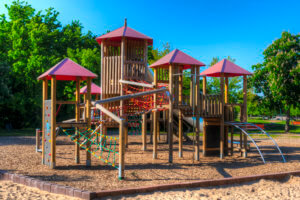 The sun’s out, flowers are blooming and your residents can’t wait to enjoy the summer weather. Your outdoor amenities will see a rise in popularity as the temperatures climb. Expect large crowds (within CDC guidelines) anywhere residents can picnic and play. And not just from the humans – these areas appeal to pests as well. Before the season gets in full swing, consider some of the pests that could give residents the summertime blues.
The sun’s out, flowers are blooming and your residents can’t wait to enjoy the summer weather. Your outdoor amenities will see a rise in popularity as the temperatures climb. Expect large crowds (within CDC guidelines) anywhere residents can picnic and play. And not just from the humans – these areas appeal to pests as well. Before the season gets in full swing, consider some of the pests that could give residents the summertime blues.
Mosquitoes
Enemy number one of summer fun is the mosquito. Not only are their bites itchy, but they can also transmit diseases. Dangerous viruses like Eastern Equine Encephalitis, Zika, West Nile, and Malaria can all be spread through a mosquito bite.
Ongoing mosquito treatment program at the property you manage will reduce mosquito populations and help keep your residents protected. Your team can focus on eliminating factors that attract mosquitoes – starting with standing water. They need only a small amount of water to breed, so any standing water is an invitation for mosquitoes to make more mosquitoes. In addition, to deter them from areas frequented by people, use fans – which can overpower these poor fliers.
Ticks
Another dangerous biter is the tick. Steady growth in the populations of these arachnids means more chances to encounter their blood-sucking bites. Like mosquitoes, ticks can transmit diseases while feeding. These include Lyme disease and Rocky Mountain Spotted Fever. In spite of its name, Rocky Mountain Spotted Fever is prevalent among ticks in the Northeast.
Overgrown vegetation gives ticks a covert hiding place until they sense an opportunity to hitchhike on their next meal. Wooded areas with walking paths or bike trails make a perfect place for ticks to prey on your residents. Make sure your landscaping team keeps the grass closest to these paths well-trimmed and suggest to residents that they wear a repellent labeled for ticks when they plan to visit these areas of your property. Also consider implementing a tick control service, which can greatly reduce the number of ticks on your property.
Stinging Insects
In addition to biters, you also need to consider stingers. From yellow jackets and hornets to bees and wasps, these pests pack a painful sting. Generally, these stings result in redness and swelling, but some residents may have severe allergies that can be life-threatening. Ensure these pests don’t nest in areas frequented by residents and contact a professional for help with safely removing their nests.
Flies
Because they don’t sting or bite, it can be easy to write off flies as simply a nuisance pest. The truth is: flies don’t need to bite to transfer disease. They lurk in some of the filthiest places, like dumpsters, where they collect and distribute bacteria like staphylococcus, E Coli and even typhoid fever.
When you notice an uptick in fly activity, investigate what sanitation problems might be at the root of the problem. The odors from garbage cans and dumpsters and the build-up in drains serve as a beacon to attract flies. You may want to empty and rotate dumpsters more frequently during the summer months when higher temperatures can exacerbate odor and generally increase your sanitation in drains and other problem areas.
Spring Cleaning for Summer Season
Now is the time to tackle your spring to-do list related to pest prevention preparation before peak pest season arrives.
- Survey your property the next time it rains for any places where puddles collect and present a prime breeding ground for mosquitoes. Take action to fix drainage downfalls.
- Consider where you need to give attention to vegetation that could harbor ticks. Ask your landscape crew to make sure that frequently trafficked areas don’t get overgrown.
- At the first sign of stinging pests swarming around popular outdoor areas, do your best to track them to their nest. Call a professional to help you safely remove the source of your problem.
- Make a plan for keeping dumpsters and drains clean in the hot summer months (and all months, really). Establish a rotation plan for garbage receptacles and a sanitation plan for outdoor drains to keep from collecting flies in either place.
Your residents aren’t the only ones welcoming the summer months. Pests thrive in the warmer weather, and your best resident amenities can turn into pest havens if you don’t have a plan. Waltham Pest Services can help you with that – we’ll inspect your property, show you where your trouble spots are, and help you protect your residents while they’re enjoying the great outdoors.
